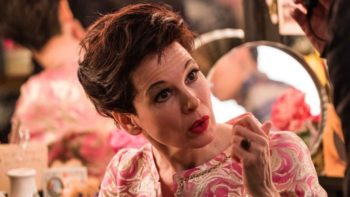
“Judy” chronicles the scandal and difficulty that plagued Judy Garland (Renée Zellweger) in her last years. Image courtesy of Pathé and BBC Films.
This review contains spoilers.
The 2019 film “Judy” opens on Metro-Goldwyn-Mayer Studios executive Louis B. Mayer leading a fourteen year old girl into an audition room. According to Mayer, she’s a Midwestern farm girl; an ignorant nobody from nowhere worth nothing to anyone who has two pennies to rub together. She is, however, special in one way: Mayer thinks she’s got that thing, that certain untested talent for performance which so few possess and are able to develop.
First, he declares, “Let’s see how Judy measures up.”
If readers don’t recognize Judy Garland by name, they know her as Dorothy in the 1939’s “The Wizard of Oz,” and if they haven’t seen “Oz,” they’ve heard the aphorisms, heard the song of longing for the place over the rainbow where dreams come true. So famous is the movie that its making passed into urban legend; “Oz” presides in the American cultural imagination as the critical inspiration for so many later films.
“Judy” tries to conjure the living memory of an icon, but ends up inaccurately memorializing the person. In that respect, we’ve seen this biopic before. Long stretches of screen time are carried by Renée Zellweger’s striking and charming performance as Garland, but the film misses the mark overall.
Heavily featured are Garland’s final years as she struggles to overcome debt, severe drug dependencies, and psychological pain incurred in no small part by the Hollywood system — which elevated her to stardom — all the while fighting to maintain custody of her children. Garland wants nothing else than to keep the innocent love she has with her kids. Take the money, take the lights, take the romantic flings, take it all — but don’t take her children… or the music.
The film does make for a somewhat interesting social commentary. Garland began performing at the age of two, and was closely groomed from adolescence to stardom by Mayer, a co-founder of MGM Studios. MGM and Mayer specifically are credited here with traumatizing Garland as a child into young adulthood, causing the recurring pain that contributed to her early death at age 47 (though, Garland benefited from forms of privilege that Black performers such as Billie Holiday did not). The movie contextualizes the #MeToo movement by showing that Garland and other women have been speaking to the impacts of abuses of power for decades, if not centuries.
Goold moves between early and late in Judy Garland’s career. Many of these scenes are so precisely scripted that it is easy to imagine a meeting of estate representatives to carefully calculate all of Garland’s snappy lines. The film imitates the dramatic cinematic style of Golden Age Hollywood films, which ultimately limits the film’s range with a sense of inevitability: fights between lovers play out with the usual lines, and end in the kind of heartbreak common to the silver screen. “Judy” may have been more organic if a director such as Greta Gerwig had been selected to craft it rather than Rupert Goold, a theater director whose career trends more toward canonical, male-dominated projects. The one distinctive element is Judy Garland, whose essence passes through only briefly.
The most compelling moments in the film are also its warmest, and feature Garland embracing fans, friends, and close family in intimate, vulnerable situations. For example, in a particularly moving scene Garland is hosted for dinner by a gay couple in London after she’s finished performing. Despite the stiff dialogue, the actors manage a profound emotional connection. Judy is a comfort to these men, and she wholeheartedly accepts that role.
But the film’s optimistic edge is undercut by the fact that any interested viewer is likely already aware of Garland’s untimely death. For conscience or levity, Goold ends the film by framing Garland’s last moments as fully content in her fans’ adoration, therefore offering the audience a clean, pleasant resolution on the matter that Garland did not get. Despite its urgency, “Judy” does not successfully lift its star out out of the scandal that surrounds her death.
In his Great Movies review of “Oz,” the late film critic Roger Ebert wrote that “Oz” is about “the key lesson of childhood, which is that someday the child will not be a child, that home will no longer exist, that adults will be no help because now the child is an adult and must face the challenges of life alone. But that you can ask friends to help you. And that even the Wizard of Oz is only human, and has problems of his own.”
“Judy” lacks the brains, the heart, and the courage to be inspired by “Oz,” or even to simply echo its message. Garland’s impact will likely endure despite this latest in a long line of failures to do it justice. So, viewers may hope that someday someone may find a way to help her memory overcome the forces that calculated her rise and demise.
MPAA Rating: PG-13
Run-time: 1 hr 58 min
Rating: 2/4





Comments